Pasopa Nantsi ndodemnyama, Verwoerd!
Pasopa Nantsi ndodemnyama, Verwoerd!
Pasopa Nantsi ndodemnyama, Verwoerd!
Pasopa Nantsi ndodemnyama, Verwoerd!
Nantsi ndodemnyama, Verwoerd!
Nantsi ndodemnyama, Verwoerd!
Nantsi ndodemnyama, Verwoerd!
Nantsi ndodemnyama, Verwoerd!
Pasopa Nantsi ndodemnyama, Verwoerd!
Pasopa Nantsi ndodemnyama, Verwoerd!
Pasopa Nantsi ndodemnyama, Verwoerd!
Pasopa Nantsi ndodemnyama, Verwoerd!
Pasopa Nantsi ndodemnyama, Verwoerd!
Pasopa Nantsi ndodemnyama, Verwoerd!
Pasopa Nantsi ndodemnyama, Verwoerd!
Nantsi ndodemnyama, Verwoerd!
Nantsi ndodemnyama, Verwoerd!
Nantsi ndodemnyama, Verwoerd!
Nantsi ndodemnyama, Verwoerd!
Pasopa Nantsi ndodemnyama, Verwoerd!
Pasopa Nantsi ndodemnyama, Verwoerd!
Pasopa Nantsi ndodemnyama, Verwoerd!
Pasopa Nantsi ndodemnyama, Verwoerd!
envoyé par Dead End - 7/9/2012 - 15:24
Di questa canzone di lotta ho raccontato la storia più nota, quella del mostro che creò l’apartheid e del piccolo greco comunista che lo uccise e che, considerato pazzo, finì i suoi giorni tra prigioni e cliniche psichiatriche senza che nessuno, nemmeno dopo il trionfo di Mandela nel 1994, lo abbia mai ringraziato...
Ma dietro questo grido di lotta, scandito durante le imponenti manifestazioni contro Verwoerd
e i suoi successori fino a Botha, c’è un’altra storia meno conosciuta che voglio provare a raccontare.
La frase in lingua xhosa «Nantsi ndodemnyama» (che trovo in rete anche in grafie diverse come «Naants’indod’emnyama» o «Naants' Indod' e Mnyama», e se sapessi qual’è quella corretta probabilmente vi scriverei da Johannesburg e non da Torino...) significa «Here Comes Black People», «Stanno arrivando i neri», e fu coniata all’inizio degli anni 60 da Vuyisile Mini (1920-1964), musicista e cantautore e militante di Umkhonto we Sizwe (Spear of the Nation), il braccio armato dell’African National Congress. Nelle manifestazioni la gente scandiva questa frase aggiungendoci «Pasopa Verwoerd!» (e dopo Vorster, il suo successore), ossia «Beware Verwoerd/Vorster!», storpiando il termine afrikaans «pas op»
«Attento Verwoerd, i neri stanno arrivando!» doveva essere impressionante urlata da un’enorme massa compatta di persone che correndo e saltando si muoveva come un solo corpo...
La forza del canto e la sua popolarità irritarono molto il regime che ben presto trovò il modo di mettere la mani sul suo autore. Vuyisile Mini fu arrestato il 10 maggio del 1963 insieme ad altri due attivisti membri dell’ANC, Wilson Khayinga e Zinakile Mkaba. Accusati di sabotaggio ed altri reati politici e dell’assassinio di un informatore della polizia, i tre furono condannati a morte e rinchiusi nella prigione di Pretoria.
Il 6 novembre del 1964 Vuyisile Mini e i suoi due compagni furono impiccati.
Gli altri detenuti raccontarono che Vuyisile Mini si avviò verso il patibolo cantando «Pasopa Nantsi ndodemnyama, Verwoerd!» con la sua potente voce da basso che risuonava in tutta la prigione. Questa è la testimonianza di uno di loro, Ben Turok, pubblicata sul giornale dell’ANC:
Questi invece sono i versi che a Mini e ai suoi compagni assassinati dal regime dedicò Kumalo, un poeta militante dell’ANC (dall’album «The spear of the nation» del gruppo Mayibuye, 1978):

I corpi di Mini e compagni furono sepolti segretamente a Pretoria.
Vennero individuati e riesumati solo nel 1998 ed ebbero finalmente funerali da eroi quali essi furono.
Ma dietro questo grido di lotta, scandito durante le imponenti manifestazioni contro Verwoerd
e i suoi successori fino a Botha, c’è un’altra storia meno conosciuta che voglio provare a raccontare.
La frase in lingua xhosa «Nantsi ndodemnyama» (che trovo in rete anche in grafie diverse come «Naants’indod’emnyama» o «Naants' Indod' e Mnyama», e se sapessi qual’è quella corretta probabilmente vi scriverei da Johannesburg e non da Torino...) significa «Here Comes Black People», «Stanno arrivando i neri», e fu coniata all’inizio degli anni 60 da Vuyisile Mini (1920-1964), musicista e cantautore e militante di Umkhonto we Sizwe (Spear of the Nation), il braccio armato dell’African National Congress. Nelle manifestazioni la gente scandiva questa frase aggiungendoci «Pasopa Verwoerd!» (e dopo Vorster, il suo successore), ossia «Beware Verwoerd/Vorster!», storpiando il termine afrikaans «pas op»
«Attento Verwoerd, i neri stanno arrivando!» doveva essere impressionante urlata da un’enorme massa compatta di persone che correndo e saltando si muoveva come un solo corpo...
La forza del canto e la sua popolarità irritarono molto il regime che ben presto trovò il modo di mettere la mani sul suo autore. Vuyisile Mini fu arrestato il 10 maggio del 1963 insieme ad altri due attivisti membri dell’ANC, Wilson Khayinga e Zinakile Mkaba. Accusati di sabotaggio ed altri reati politici e dell’assassinio di un informatore della polizia, i tre furono condannati a morte e rinchiusi nella prigione di Pretoria.
Il 6 novembre del 1964 Vuyisile Mini e i suoi due compagni furono impiccati.
Gli altri detenuti raccontarono che Vuyisile Mini si avviò verso il patibolo cantando «Pasopa Nantsi ndodemnyama, Verwoerd!» con la sua potente voce da basso che risuonava in tutta la prigione. Questa è la testimonianza di uno di loro, Ben Turok, pubblicata sul giornale dell’ANC:
"The last evening was devastatingly sad as the heroic occupants of the death cells communicated to the prison in gentle melancholy song that their end was near... It was late at night when the singing ceased, and the prison fell into uneasy silence. I was already awake when the singing began again in the early morning. Once again the excruciatingly beautiful music floated through the barred windows, echoing round the brick exercise yard, losing itself in the vast prison yards.
And then, unexpectedly, the voice of Vuyisile Mini came roaring down the hushed passages. Evidently standing on a stool, with his face reaching up to a barred vent in his cell, his unmistakable bass voice was enunciating his final message in Xhosa to the world he was leaving. In a voice charged with emotion but stubbornly defiant he spoke of the struggle waged by the African National Congress and of his absolute conviction of the victory to come. And then it was Khayinga's turn, followed by Mkaba, as they too defied all prison rules to shout out their valedictions. Soon after, I heard the door of their cell being opened. Murmuring voices reached my straining ears, and then the three martyrs broke into a final poignant melody which seemed to fill the whole prison with sound and then gradually faded away into the distant depths of the condemned section."
And then, unexpectedly, the voice of Vuyisile Mini came roaring down the hushed passages. Evidently standing on a stool, with his face reaching up to a barred vent in his cell, his unmistakable bass voice was enunciating his final message in Xhosa to the world he was leaving. In a voice charged with emotion but stubbornly defiant he spoke of the struggle waged by the African National Congress and of his absolute conviction of the victory to come. And then it was Khayinga's turn, followed by Mkaba, as they too defied all prison rules to shout out their valedictions. Soon after, I heard the door of their cell being opened. Murmuring voices reached my straining ears, and then the three martyrs broke into a final poignant melody which seemed to fill the whole prison with sound and then gradually faded away into the distant depths of the condemned section."
Questi invece sono i versi che a Mini e ai suoi compagni assassinati dal regime dedicò Kumalo, un poeta militante dell’ANC (dall’album «The spear of the nation» del gruppo Mayibuye, 1978):
A POEM OF VENGEANCE
Mini,
Big strong smiling Mini
and Khayinga and Mkaba who loved life
no less, have been robbed
of their most precious possession,
life.
Our comrades fell
in Verwoerd's Pretoria
bitten in the neck
by the hangman's knot.
Have you seen life slipping away?
I once saw my mother die
on the sharp sand at Sharpeville.
I hear Babla my brother cry
and his body hitting concrete
one hundred feet down
from the interrogator's window.
Have you seen the face of a man being beaten up?
In prison
when you hear the noise
your heart-beats race.
But worst of all
is the sigh
or shriek
or cough
or nothing
just escaping air
as life slips away.
How did Mini and my brothers die
in that secret hanging place?
You may ask - please let me tell you -
I know.
Singing? Yes - but how they sing!
Big firm Mini
not smiling on this day
a smile at the lips perhaps
but the eyes grim
always grim
when facing the enemy.
Heads high they walk
strong united together
singing Mini's own song
'Naants' indod' emnyama Verwoerd'
- Watch out Verwoerd the black man will get you
'Watch out Verwoerd'
the people have taken up this song
'Watch out Verwoerd'
the world sings with Mini.
And meeting Death
in their front-line trench
the three heroes shout
into the grey teeth of the enemy
'We shall be avenged'
and the people take up the shout
'Our heroes shall be avenged.'
It is vengeance we want
as the last precious gasps
escape into the Pretoria air.
Mini,
Big strong smiling Mini
and Khayinga and Mkaba who loved life
no less, have been robbed
of their most precious possession,
life.
Our comrades fell
in Verwoerd's Pretoria
bitten in the neck
by the hangman's knot.
Have you seen life slipping away?
I once saw my mother die
on the sharp sand at Sharpeville.
I hear Babla my brother cry
and his body hitting concrete
one hundred feet down
from the interrogator's window.
Have you seen the face of a man being beaten up?
In prison
when you hear the noise
your heart-beats race.
But worst of all
is the sigh
or shriek
or cough
or nothing
just escaping air
as life slips away.
How did Mini and my brothers die
in that secret hanging place?
You may ask - please let me tell you -
I know.
Singing? Yes - but how they sing!
Big firm Mini
not smiling on this day
a smile at the lips perhaps
but the eyes grim
always grim
when facing the enemy.
Heads high they walk
strong united together
singing Mini's own song
'Naants' indod' emnyama Verwoerd'
- Watch out Verwoerd the black man will get you
'Watch out Verwoerd'
the people have taken up this song
'Watch out Verwoerd'
the world sings with Mini.
And meeting Death
in their front-line trench
the three heroes shout
into the grey teeth of the enemy
'We shall be avenged'
and the people take up the shout
'Our heroes shall be avenged.'
It is vengeance we want
as the last precious gasps
escape into the Pretoria air.

Installazione dedicata a Mini e compagni, presso il Red Location Museum di Port Elisabeth, città natale di Vuyisile Mini.
I corpi di Mini e compagni furono sepolti segretamente a Pretoria.
Vennero individuati e riesumati solo nel 1998 ed ebbero finalmente funerali da eroi quali essi furono.
Dead End - 9/9/2012 - 10:39
A Vuyisile Mini, un anno dopo il suo assassinio, fu dedicato un intero disco collettivo intitolato "This Land Is Mine", curaro da Moses Asch e pubblicato dalla Smithsonian Folkways Records.
Dead End - 9/9/2012 - 13:28
×
![]()


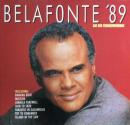

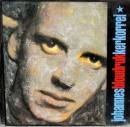
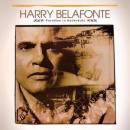

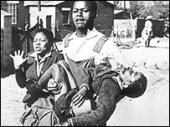
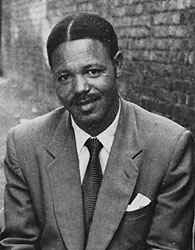

Album “An Evening with Belafonte/Makeba”.
Autore: Vuyisile Mini.
“Attento, Verwoerd!” è un canto diretto a Hendrik Frensch Verwoerd (1901-1966), teorico e pratico del sistema segregazionista dell’apartheid, primo ministro del Sudafrica dal 1958 fino al suo assassinio ad opera di Dimitri Tsafendas, un immigrato greco, comunista, il quale per via della pelle non proprio chiara e delle sue idee era stato ostracizzato dalla società dei bianchi e che, a causa delle difficoltà incontrate nel paese che non lo aveva integrato, era andato alquanto fuori di testa. Si era certamente trattato di un delitto almeno indirettamente politico ma Tsafendas fu riconosciuto totalmente infermo di mente, schizofrenico. Il giudice però, anziché provvedere al ricovero in un centro di cura, sentenziò che la durata della sua pena era affidata al buon cuore del Presidente… Così Tsafendas fu rinchiuso nel braccio della morte del carcere di Pretoria, nella cella accanto alla camera d’esecuzione dei condannati a morte… Un bel modo per torturare un prigioniero riconosciuto pazzo! Tsafendas non è mai stato rilasciato, nemmeno dopo la fine dell’apartheid, ed è morto in un ospedale psichiatrico nel 1999 dopo quasi 30 anni di galera.
Insomma, colui che riuscì ad uccidere l’ideatore di quella mostruosità che fu l’apartheid fu sempre e soltanto considerato un pazzo ed il suo gesto non fu mai riconosciuto come politico da nessun movimento di liberazione sudafricano, nemmeno dall’ANC. In realtà però personalità e motivazioni di Tsafendas non furono mai indagate a fondo e – anche considerando la fine che gli fecero fare – probabilmente l’assassino di Verwoerd fu un uomo sano catapultato in un sistema assurdo, violento e contraddittorio che prima lo stritolò e poi lo designò come capro espiatorio.